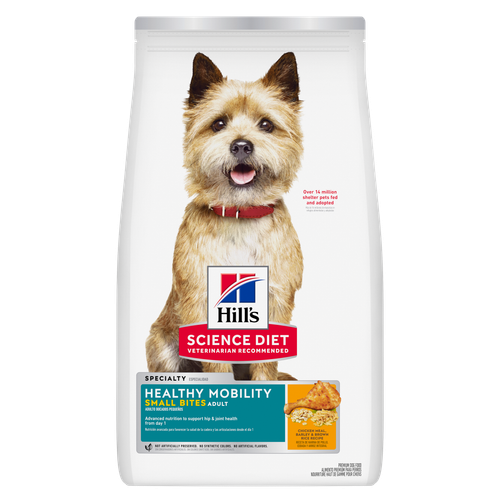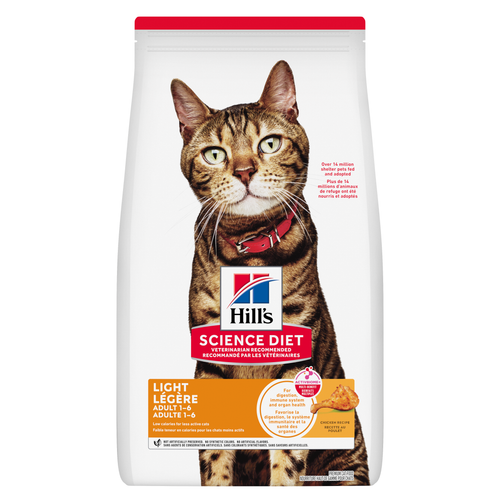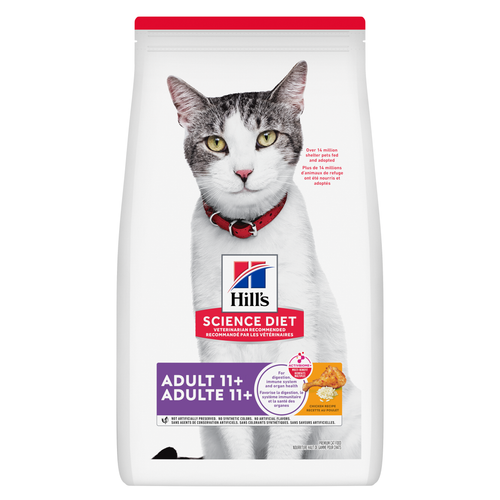
-
Find the right food for your petTake this quiz to see which food may be the best for your furry friend.Find the right food for your petTake this quiz to see which food may be the best for your furry friend.Featured products
 Adult Healthy Mobility Small Bites Chicken Meal, Barley & Brown Rice Recipe Dog Food
Adult Healthy Mobility Small Bites Chicken Meal, Barley & Brown Rice Recipe Dog FoodAdvanced nutrition to support hip & joint health from day 1
Shop Now Adult Sensitive Stomach & Skin Small & Mini Chicken Recipe Dog Food
Adult Sensitive Stomach & Skin Small & Mini Chicken Recipe Dog FoodHill's Science Diet Sensitive Stomach & Skin Small & Mini dry dog food is tailored nutrition for Small & Mini dogs while being gentle on stomachs. Nourishes skin & promotes a lustrous coat.
Shop Now Adult Light Large Breed Chicken Meal & Barley Recipe Dog Food
Adult Light Large Breed Chicken Meal & Barley Recipe Dog Food18% lower calories vs. Science Diet Large Breed Adult
Shop NowFeatured products Adult Healthy Cuisine Seared Tuna & Carrot Medley Cat Food
Adult Healthy Cuisine Seared Tuna & Carrot Medley Cat FoodDelicious seared tuna paired with tender carrots in a mouthwatering sauce
Shop Now Adult Light Chicken Recipe Cat Food
Adult Light Chicken Recipe Cat Food20% lower calories vs. Hill's Science Diet Adult
Shop Now Adult 11+ Chicken Recipe Cat Food
Adult 11+ Chicken Recipe Cat FoodSupports brain health & beautiful fur. Helps keep immune system, heart & kidneys healthy.
Shop Now -
Dog
- Dog Tips & Articles
-
Health Category
- Weight
- Food & Environmental Sensitivities
- Urinary
- Digestive
- Joint
- Kidney
- Dental
- Cancer
-
Life Stage
- Puppy Nutrition
- Adult Nutrition
- Senior Nutrition
Cat- Cat Tips & Articles
-
Health Category
- Weight
- Skin & Food Sensitivities
- Urinary
- Digestive
- Kidney
- Dental
- Stress
- Cancer
-
Life Stage
- Kitten Nutrition
- Adult Nutrition
Featured articles Water
WaterDiscover why water is the most important nutrient for your dog or cat to live a healthy life. Find out how much water your pet should consume each day.
Read More Importance of DHA in your Pet's Food
Importance of DHA in your Pet's FoodLearn about DHA, Docosahexaenoic Acid, a natural omega-3 fatty acid that is essential in the development of the brain and nervous system in cats & dogs.
Read More Antioxidants
AntioxidantsUnderstand the importance of antioxidants in your dog or cat's food, and how they can help protect your pet and keep them healthy.
Read More -


You've probably heard about female dogs going into heat — but what about males? Do male dogs go into heat, too? If so, how long do they stay in heat? Here's what pet parents should know.
Male Dogs in Heat?
Do male dogs go into heat? In short: No. "In heat," or estrus specifically refers to the time in the female dog's reproductive cycle where she becomes receptive to mating with males. According to the American Kennel Club, male dogs don't go into heat; instead, they're capable of mating year-round once they become fertile at about 6 months old.
A dog's breed and size plays a role in when she first goes into heat, but generally speaking most dogs will reach sexual maturity at around 6 months — some dogs can go into heat as early as four months, while large and giant breeds may take up to two years before their first heat cycle. A heat cycle occurs every six to eight months and lasts approximately three weeks. While in heat, a female dog is especially attractive to male dogs and will experience a swollen vulva, vaginal bleeding and more frequent urination.


Tasty Tips
We believe that science is the best path to giving your pet the best care possible.

Male dogs don't go into heat
Caring for Your Male Dog Around a Female in Heat
While male dogs do not go into heat, when female dogs go into heat it can have a major impact on them.
When a female dog is in heat, she releases a pheromone called Methyl p-hydroxybenzoate that has shown to sexually arouse male dogs that pick up that scent. That's by design, of course — but it can stir up a lot of chaos for you and your canine companion. If an intact male dog catches the scent of a nearby female in heat, she will become his entire focus. Male dogs may stop eating, increase their marking, become increasingly aggressive and obsess over tracking down the female dog in heat throughout the duration of her cycle.
If you have an intact male dog who lives near an intact female dog, it's important to keep him as far from her as possible when she's in heat if you are not looking to breed with your dog. Be sure to take your male dog out for lots of independent exercise and activity and keep him distracted as best as you can. Certain pheromone sprays can also be helpful during these times, particularly if there's some distance between the two dogs to start. Be sure to speak to your veterinarian before using any of these sprays.
How Neutering Can Help
Neutering your male dog can help curb many of the negative behaviors associated with sexual maturity, such as marking, mounting and roaming. It can also reduce some types of aggression. Neutering may help reduce the possibility of benign prostatic hyperplasia (enlarged prostate gland), perianal tumors and hernias. testicular tumors.
Now you know: Male dogs don't go into heat. But that doesn't make their sexual maturity any less challenging for them or for their pet parents. Be sure to talk to your veterinarian to discuss how to deal with your dog's behaviors, especially if he hasn't been neutered.


Erin Ollila believes in the power of words and how a message can inform—and even transform—its intended audience. Her writing can be found all over the internet and in print, and includes interviews, ghostwriting, blog posts, and creative nonfiction. Erin is a geek for SEO and all things social media. She graduated from Fairfield University with an M.F.A. in Creative Writing. Reach out to her on Twitter @ReinventingErin or learn more about her at http://erinollila.com.

See what Vets have to say
Read reviews from the experts and see why Hill's is the #1 Veterinarian Recommended brand.
See what Vets have to say
Read reviews from the experts and see why Hill's is the #1 Veterinarian Recommended brand.



